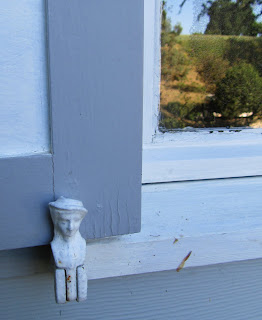They say the mushrooms have been wondrous this year, but not on my patch. A couple of fairy-tale Amanita, or fly agaric, with their bright red caps, and some yellow fungus, but that's it, really. The grapes were plentiful, little velvety black cobs, good for eating like sweet miniature corn, and hazelnuts, 1.
The most successful crop was two hessian bags of Black Shetland potatoes. They grew resplendant in a sunny corner outside the kitchen, but when they started to yellow, I thought I had lost them. It turns out that's what potatoes do. I finally got up the courage to tip them out, and what excitement. Bright purple - with a creamy nutty flavour. Two sacks full didn't exactly keep us in potatoes for the winter, but they were a joy for a few meals. Next year, six sacks.
And so to preserving. Last year, there were quinces galore in Waitrose. This year, one blink and the season was over. None. I was looking at a whole year without quince cheese. Quince cheese is a far meatier version of quince jelly. This time you discard the clear juice (or make jelly as well), and mill the drained cooked fruit till smooth - but with a distinctive graininess. Boiled slowly with sugar till very thick, it can be cut into chunky pieces to be served with lamb or pork or game or sausages. Everything, really.
Luckily I found some French ones at the very smart delicatessen in the Village. I scrubbed and boiled them up together. Oh I've done this plenty of times now, Milled fruit back in the pan, equal amount of sugar, boil gently. But I got distracted and when I came to check, the sugary fruit was a volcano. This is quite dangerous in fact, because of course boiling sugar can burn you, and burn it jolly well did. It exploded all over the cooker and into my face. If you don't want to look like you've got the pox, watch the pot, and keep stirring. Not content with spatters of crystalized sugar all over the cooker, I managed to let it stick and blacken too. What was salvaged was dark and tasteless. I bottled it anyway, but a couple of weeks later, passing the same shop, I happily found some more, and started again. Gentle heat, watched all the time, the new batch had the colour of intense guava, with the sweet aroma of the freshest fruit. That's what it's all about. Lesson: don't get blasé.
There might be the occasional moment in my life when I feel a little melancholy. And so it was that I was staring at my garden wondering what it was all for, when down flew a giant heron. It had chosen my pond for a silent vigil. Oh bless, I thought, a heron! Then it dawned on me it had probably come to feed on the defenceless little newts. My newts! Oh dear, should I chase it away. But it's a heron! Heron/newts/heron/newts? I didn't have to struggle against nature for too long. After ten minutes, it hopped away and then took off gracefully for some less angst-protected prey. Photographs taken, mood settled, and all was once again well with the world.
Warm it may be, but still it's the time for slow cooking. I've done this dish with lots of different game birds, and you can't go wrong.
Duck legs in Lentils: Prick and trim excess fat from the legs, place them in a roasting tray covered with foil, and allow to bake for about an hour on a low heat - 150 or less. In a separate pan fry lardons, then a chopped onion. Bay leaf, garlic, whatever. Make some stock, and put the fried onions and bacon into the roasting pan around the duck, a cup or so of puy lentils, cover well with the stock, again with the foil, and back for another hour, maybe less. You need to keep an eye on it because you don't want the lentils over-cooked and dry, but you want all the stock to be absorbed, so remove the foil to get the lentils done, but are still creamy, put near the top of the oven or under the grill, teeny bit of salt on the duck, and crisp up the skin. It's a cinch.



















